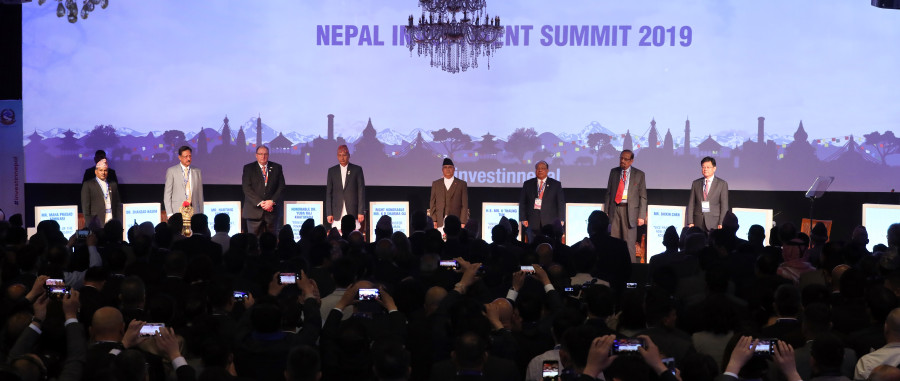National
At the Investment Summit, government showcases the country’s mega projects—and its gender disparity
The eleven main sessions and two side events, about women in business and youth entrepreneurship on Friday and Saturday, will see a total of 92 speakers, of which only 11 are women.
Minutes after the Nepal Investment Summit kicked off on Friday morning, pictures and videos of the inaugural session began trickling on social media. Prime Minister KP Sharma Oli shared the brightly-lit stage with Finance Minister Yuba Raj Khatiwada and representatives of different countries and organizations.
The eight men on stage spoke about double-digit growth and higher investments in manufacturing, tourism and energy, while the audience, also a sea of dhaka topi and bald spots, applauded. And soon, some people at the summit took to social media to point out the skewed representation of women in Nepal’s biggest stage pushing for economic growth.
“Kick off @ Nepal Investment Manference full of #Manels. I am all for #InvestInNepal but how in the world are we supposed to achieve economic development without the participation of half the population,” a female participant at the Summit wrote on Facebook, accompanied by a picture of the all-male panel and mostly male audience.
But panels with similar gender make up continued throughout the day. The eleven main sessions and two side events, about women in business and youth entrepreneurship on Friday and Saturday, will see a total of 92 speakers, of which only 11 are women. The highest participation of women speakers is in the ‘Women in Business’, a side event, which has five women and three men as speakers.
“It’s not just in the Summit, everywhere in events like these you see higher male presence, especially in private sector,” said Bhawani Rana, president of Federation of Nepalese Chambers of Commerce and Industry (FNCCI). “This won’t change unless we get more women in leadership roles.”
Rana is the first woman to lead Nepal’s private sector and will be sharing the stage on a session tomorrow with seven men.
The increasing number of young female entrepreneurs in the last decade and a half has been promising. But the lack of exposure in high profile events like the Investment Summit could hinder their growth, according to business insiders. The only session dedicated to young entrepreneurs is a side event, and all the five speakers talking about youth entrepreneurship development are also men.
Young women who have made a name for themselves in Nepal’s growing startup scene say they feel left not just in the summit but also in the larger conversations around business policy discourse in the country.
“Why weren’t we given space in the Summit?” said Nikita Acharya, the co-founder Urban Girl, an online shopping platform. “There is not an ounce of effort to involve us in matters concerning our businesses.”
Women from investment firms and multilateral agencies at the summit told the Post how disheartening it was to be faced with a panel of half a dozen men at the outset of the event. Among them was a female participant who vented her frustration on the condition of anonymity because her organization doesn’t allow making such candid statements to the media.
“All this talk of women empowerment and entrepreneurship and all of them are shunted to a side event,” she said. “Their defence is that it is a group of positions rather than individuals, but that makes the exclusion of women in the upper echelons even more visible and frightening.”




 8.43°C Kathmandu
8.43°C Kathmandu













